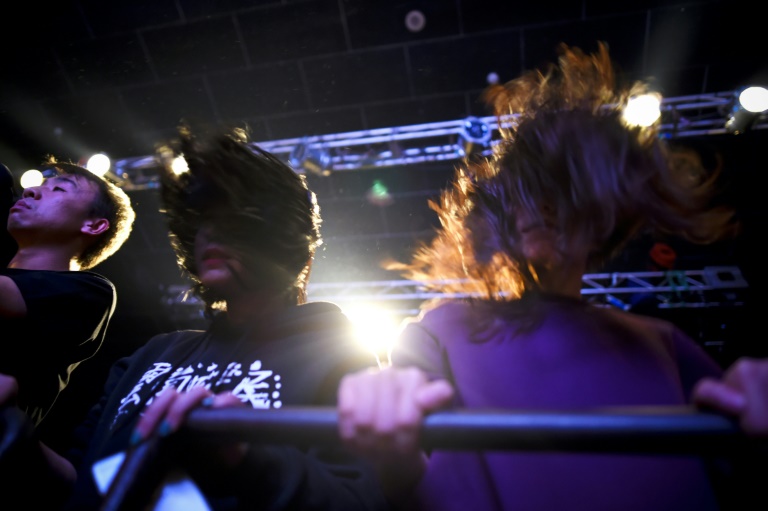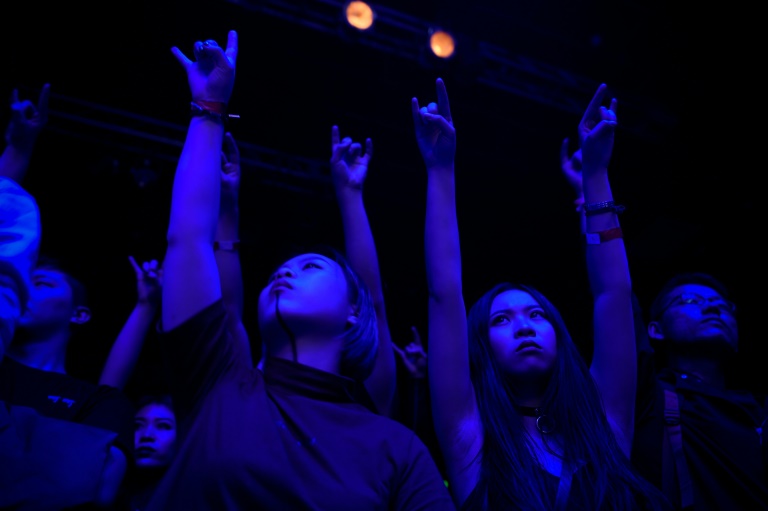Screaming Chinese-poetry inspired lyrics like a demon bursting from the depths of hell, the black-clad singer raises a white chalice above his bamboo hat as fog enveloped the stage.

Powered by cacophonous guitars and drums, the black metal band Zuriaake dips into the tenebrous depths of ancient Chinese culture to produce a unique blend of east and west.
Though the breed of occult darkness their music celebrates is unwelcome by authorities, the group is enjoying a new surge of popularity among mainland listeners seeking music that reflects their growing national pride.
“Out in the land of bones, the hellfire lingers with shimmering luminance,” the singer known as “Bloodfire” howls at a crowd of hundreds in Beijing, silhouetted against a projected backdrop of an eerie black-and-white forest.
His shrieking lyrics are written in a dense style of ancient poetry that even those able to make out the words of his throat-raking rasp would need a dictionary to decipher.

Chinese black metal band Zuriaake has inadvertently ridden a rising wave of interest in nationalist pop culture as the ruling Communists trumpet messages of the nation’s exceptionalism, said one music executive in the crowd
Zuriaake, formed in 1998, is one of China’s longest-running metal bands. Its name is an invented Chinglish portmanteau meaning “lake of buried corpses”.
Songs such as “Desolated Mountain” and “Whispering Woods” get audiences headbanging to subtle verses packed with dark nature imagery.
The band wears head-to-toe black, with their faces entirely shrouded under their triangular hats. Bloodfire also wears a woven reed raincoat.
The costumes are meant to evoke the image of an old fisherman in a Chinese landscape painting, alone in his skiff and dwarfed by the nature around him. Lanterns and branches adorn their mic stands.
The band has inadvertently ridden a rising wave of interest in nationalist pop culture as the ruling Communists trumpet messages of Chinese exceptionalism, said a black metal music label founder in the audience who gave the pseudonym VT.
He called the process “our society marketing itself to itself.”
“Young people don’t necessarily believe in everything the government says, but now that China is becoming a bigger global power, they still want to find things that fit with their Chinese identity” to be fans of, he said.
“Zuriaake fills that need,” he said, speaking on condition of anonymity to avoid any political backlash against his label.
– ‘Chinese-style horror’ –
Black metal is an extreme subgenre of heavy metal that rose to notoriety in the 1990s after anti-Christian Norwegian bands that spearheaded the style burned churches and in one case murdered a band member.
It typically employs nature imagery and promotes Satanism and misanthropy in protest of mainstream culture. Artists often perform in white-faced, hollow-eyed corpse make-up.
But protesting Christianity made no sense in modern China, where Communist atheism has replaced Buddhism and Daoism as the dominant dogma.

Black metal is an extreme subgenre of heavy metal that rose to notoriety in the 1990s after anti-Christian Norwegian bands that spearheaded the style burned churches and in one case murdered a band member
Nor did corpse paint, given that the Chinese imagine zombies as stiff, hopping cadavers more humorous than terrifying.
“If you’ve understood the essence of a Western genre and are still just imitating the form, you’ll slowly become mediocre. We’re playing pure Western metal, but we’re unique,” Bloodfire told AFP, refusing to give his real name.
In China, horror is “more subtle and veiled, about the unknown” rather than gore, he explained.
“I want to express Chinese-style horror, and ancient Chinese-style withdrawal from society, nobility and virtue,” he said.
To do that, the band turned to the chaotic Spring and Autumn and Warring States periods from around 771 to 221 BC for inspiration –- the last time they felt Chinese literature held an emotional intensity and despair that paired well with the black metal aesthetic.
“From that time on, Chinese poetry became more and more formalised, and became increasingly sunny – it lacked darkness,” Bloodfire said.
The band’s music, he said, tries to convey the feelings of bygone Chinese literati who sought to “live in seclusion and not involve themselves in worldly affairs, despite having a clear picture of the world and its problems.”
– ‘It speaks to me’ –
For nearly two decades, Zuriaake’s band members have remained anonymous to their fans, using stage names and never speaking in character.
Instead, they bow and make traditional hand gestures of respect towards the audience at the end of their sets.
“We want people to feel each person on stage is nothing but a symbol,” said Bloodfire.
As the birthplace of Confucius, the group’s home province of Shandong has always been “more conservative and slower to be influenced by the West than other places,” explained guitarist Sly.
While traditional culture industries boom there, there is very little by way of rock and roll.
“You can easily buy zithers, ink brushes, and chess sets, but not electric guitars,” Sly laughed, adding that it was perhaps why they felt most comfortable expressing themselves in ancient verse.
Zhang Xia, 32, flew from the southernmost province of Guangzhou just to catch Zuriaake live in Beijing.
“All of our music culture is imitating Western music, but they’re different,” she said. “I’ve always liked mystery and the occult, but because of the traditional Chinese elements, Zuriaake speaks more to me.”
Support Local Journalism
Add The Citizen as a Preferred Source on Google and follow us on Google News to see more of our trusted reporting in Google News and Top Stories.






